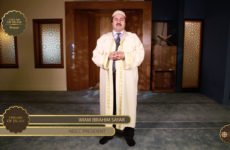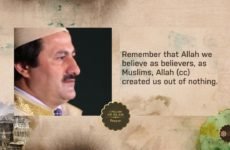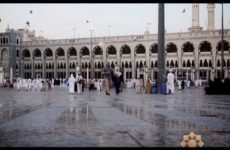Greetings and As-salamu Alaikum again. We continue to talk about the pillars of Islam. And we talked the first four and we came to the final pillar of Islam. And the sequence of these pillars from testimony to five daily prayers to religious obligatory tax, zakat, and the ramadan, it’s really for a reason and purpose. It starts with self, and it develops into community and social responsibility. And with the last pillar of Islam, with Hajj that annual, once in a lifetime, not annual, once in a lifetime journey to Mecca, it brings everything to universal human level. A journey to connect with God, an attempt to feel the presence of God in your life, and then share that responsibility with the rest of the people in your own community, in your ethnic, social, or societal community. And then you go and transcend beyond those ethnic, racial lines.
Once in a lifetime, if you are able, you journey and you responds to God’s invitation. Once in a lifetime, by going to Mecca, and circling around that house of worship, one of the first and earliest houses of worship for monotheistic message in Ka’bah built by Abraham, Hagar and Ishmael.
In one of those journeys, as I explained when I was talking to you about five daily prayers, God commands Abraham, Hagar and Ishmael to build the house of worship in the place where they were miraculously able to survive after being abandoned in the middle of the desert. And when Abraham respectfully questions,
“Why? Who will come and worship you here?”.
God Almighty said
“My believing servants will come and honor my invitation. I will invite them and they will come”.
And millions of Muslims of women for the last 1400-1500 years, they respond to this invitation by saying here I am, “Labbayk”. You called and I respond. I come in to honor your invitation to glorify your name. The entire rituals and steps of Hajj is remembering, remembering Abraham, Hagar and Ishmael. And not only Abraham, the role of Hagar and Ishmael in the story is very significant. That we go through step by step what this family after so many ways of being tested, after going through so many trials, after not seeing their prayers are answered in their lifetime. But still with a deep commitment and faith, sticking to the robe of God. And therefore five thousand years later we are still talking about them, talking about their story. And we are trying to imitate and follow their footsteps every year. Now today millions of millions of Muslim pilgrims. They go and wrap themselves with two pieces of cloth. And try to find the universal, universal message of Islam.
If you think about it, for the last 1400 years, with almost no interruption, this is the largest and most consistent and sustained universal gathering on the face of earth. Where Muslims go there, circle around the black Ka’bah, and they try to imitate the Day of Resurrection. They try to rehearse the whole scene of the Day of Resurrection. This is exactly how we are going to be resurrected. We will be resurrected and meet with our Lord where our entire life will be presented to us. And our ethnicity, race, our socioeconomic status, our education, our PhDs will not be important. What will be important is what we have done with them.
What is our ability to achieve God consciousness in life? Whatever we have received in this life, what kind of an ethical, moral life that we have led with ourselves and with our loved ones and with the people whom we are responsible for? If you follow, there are so many wonderful resources go step by step why Muslims do and take on these actual rituals in every step of the Muslim pilgrimage. But I highly encourage you to read those resources. Go beyond what Muslims do and answer the question “Why?”. Why, especially back in the days, a journey which takes 6,7,8 months, when there was no transportation opportunities that we have today. Why would every Muslim, men and women, would take and risk literally their life and journey to walk in the footsteps of Abraham, Hagar and Ishmael?
And in every step, what are some of the ethical, moral values that they are trying to embody and exemplify as they go through this journey.
Hajj is a mountain top experience for every Muslim men and women. In their life, they come back changed. One of the most climactic moment of Hajj, especially Muslim men, after they complete their Hajj, they shave their head completely. Or they try to show and scream to the rest of the world that they have changed. They will never be the same. They went and presented their life to God Almighty. They asked forgiveness in the Day of Arafat on the Mount of Mercy. They come back with an absolute, firm commitment that they will never be, they will always be a new person for the better. They will not repeat the mistakes that they have made. And they will not miss the opportunities that they have missed in the past.
So five daily pillars of Islam present the structure of Muslim devotional life, Muslim confessional life. This five practice gives a framework for every Muslim believer in their personal capacity with a lot of forgiveness, with so many, so many accommodation. If you are not healthy enough, there are different ways of doing these five pillars. If you are not rich enough, there are different ways of five daily pillars. But at the essence, these physical rituals themselves is not the point. God’s point and project as many Muslims believe was not to create perfect practice, perfect ritual, perfect way of praying and perfect way of fasting. These are not necessarily the point. The point is the way you are able to practice these five pillars. Are they making you a better people? Are they making better men and women, better husband, better wife? Is it making you more ethical, more compassionate, more gracious, more merciful person?
And Prophet Muhammad, in the words of Prophet Muhammad, says
“I have been sent by this message of Islam to perfect the good ethics. I came to perfect and complete the good ethics”.
So, as we Muslims take on these rituals, these devotional practices, and these five pillars. In many ways, what is in our GPS, our ultimate destination is through these practices and framework and disciplines, we try to be an ethical, moral people where we can uphold the ideals of Islam. And in our daily life, we can reveal the best of our religion, best of our spirituality, best of our ethical, moral teachings.
























